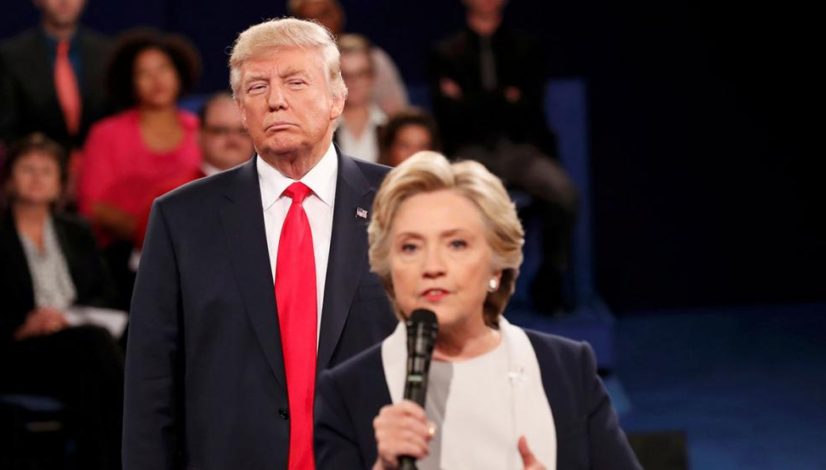“Noboday 2016” – The Campus Bumper Sticker That Helps Trumps
“Nobody 2016” stickers are all the rage at Colorado State University – summing up what a lot of Americans – and especially young Americans — think about this election. Like it or not, millennials are receiving a crash course in ugly Politics101. Not only did their hero Bernie Sanders turn traitor by endorsing Hillary Clinton; they now know, thanks to Wikileaks, that Clinton colluded with officials of the Democratic Party to cheat and beat their man.
Worse yet, they are finding out that Clinton has sold them a bill of goods. More emails reveal that she isn’t on board the Sanders revolution, and never will be. As she has said to donors, away from microphones, “I occupy the center-left to the center-right.” From the same source, they now know that the media was complicit in undermining Bernie’s run, and is politically aligned. Most uncomfortable of all, the COO of Facebook, that millennial home-away-from-home, is in the tank for Hillary, too. Is nothing sacred, they must wonder?
Meanwhile, they have heard GOP candidate Donald Trump utter words they know to be unacceptable, suggesting behavior towards women that they have been warned against in their schools and their workplaces. Countering those lewd remarks, Trump has introduced into the race the women who have accused Bill Clinton of abuse and rape, and made Hillary’s attacks on those women part of the campaign.
Can it get any worse? What does it mean for the U.S. that the next generation is coming of age politically in the midst of this election? It means even greater disillusionment with our government and, most likely, even lower voter turnout on November 8. In August, 60 percent of the 18-34 year old crowd, which numbers 75.1 million, 300,000 short of the Boomer count, said in a poll they would consider voting for a third-party candidate. That has likely declined at this point, but many apparently are still not committed to either Clinton or Trump. Consequently, millennial turnout could drop from the 2012 generation record high of 50 percent back to the 46 percent recorded in the prior two elections, or even lower. That could be a problem for Clinton.
Millennials are beginning to understand that Hillary Clinton wants their votes, but doesn’t want their problems. That goes for all American voters. Not just for those “deplorables” who support Donald Trump, or the folks she says need an “intervention” because they might vote for her opponent, but for ordinary people – like her security detail, whom she curses at in the foulest of terms, and often. (An intervention, by the way, is something you do for sick people – people with a drug or gambling addiction, for instance. Not for someone who disagrees with you.)
In an audio recording Hillary is caught describing “Children of the Great Recession” as aspiring to Socialist goals like “free college, free healthcare” even though “half the people don’t know what that means.” Clinton is talking about millennials.
Clinton also shows her disdain for Sanders supporters by baldly saying one thing in public to win their votes while saying quite another behind closed doors. Hillary says she opposes the TPP trade deal, despite having once called it the “gold standard” of such arrangements. But then, in a speech made in Brazil, Mrs. Clinton she dreams of “open trade and open borders” while Virginia Governor Terry McAuliffe, one of her closest political pals, told Politico she will endorse it once she is elected.
In trying to win over Bernie’s army, Hillary also claims to disapprove of fracking. But then she extols the virtues of fracking to a banking audience, explaining how it has ignited an energy revolution in the U.S. Ironically, in another leaked email, she accuses the Russians as funding environmentalists’ efforts to squash fracking and “that pipeline”, by which she presumably means the Keystone Pipeline. Those Russians sure are busy.
To win over the Elizabeth Warren anti-bank crowd, Hillary talks about bringing bankers to justice and toughening regulations on financial firms. But to Deutsche Bank bigwigs, she says that “financial reform “really has to come from the industry itself.” She flattered a Goldman Sachs audience by telling them “you are the smartest people.” There’s a reason financial firms have given Clinton $59 million in this election cycle alone.
Will the Wikileaks revelations make any difference? Not if the media ignores them. Just as a tree falling in the forest makes no sound, embarrassments for the Democrat contender that go under-reported may not have much impact. Other revelations from the email dump show how cozy the Clinton camp is with the media. One has New York Times reporter and CNBC anchor John Harwood bragging to Clinton operatives about his attack on Donald Trump during a debate in which he asked the GOP candidate, “Let’s be honest, is this a comic book version of a presidential campaign?” In another, a campaign apparatchik says of Maggie Haberman, formerly of Politico and now of The Times, “We have had her tee up stories for us and never been disappointed.”
Any number of journalists and news organizations have been implicated as working hand in glove with the Clinton team. The Boston Globe, for instance, appears to have helped place and construct stories helpful to Clinton strategists, while The New York Times has apparently been getting sign-off from Clinton before publishing interview quotes.
None of this would surprise Trump supporters, who have been appalled at the unprecedented mainstream media attacks on the GOP candidate. It might, however, surprise Millennials who still expect fair play. This could be the fall-out from this election: the next generation will be more skeptical of the media and of our politics. They may begin to challenge what they hear on the nightly news, and question why some stories get more play than others. And, disgusted, they may stay home on November 8. Maybe, after all, that is not such a terrible outcome.
Published here.




